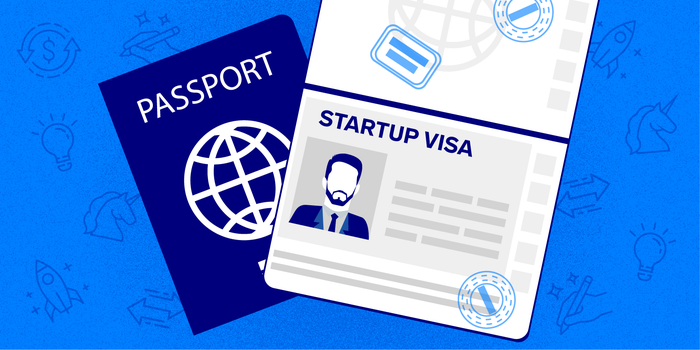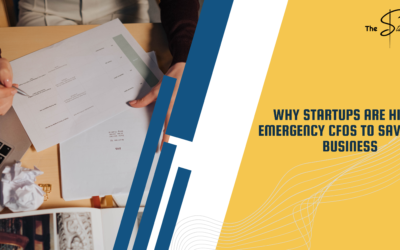In today’s interconnected world, entrepreneurship knows no borders. The Startup Visa, a relatively new concept in immigration policy, has emerged as a vital mechanism for facilitating innovation and economic growth by attracting entrepreneurial talent from around the globe. But what exactly is a Startup Visa, and why is it so crucial in the contemporary landscape of startup ecosystems?
Every country, regardless of how big or small it is, needs economic development Business persons who have the potential to contribute to the economy of a country are given a red carpet welcome by way of a Startup visa.
What is a Startup Visa?
A Startup Visa is a specialized visa program designed to encourage entrepreneurs to launch their innovative ventures in a foreign country. Unlike traditional work visas or investment-based immigration programs, the Startup Visa targets individuals with promising business ideas or early-stage startups, providing them with a streamlined pathway to establish and grow their businesses in the host country.
Key Features and Benefits of Startup Visa:
There are several additional benefits offered by a startup visa that are not part of a normal work visa.
Entrepreneurial Focus:
Startup Visas typically prioritize individuals who demonstrate a high potential for innovation and job creation. This focus on entrepreneurship distinguishes them from other immigration pathways that may prioritize employment or investment criteria.
Streamlined Application Process:
Startup Visa programs often feature simplified application procedures tailored to the needs of early-stage entrepreneurs. By reducing bureaucratic hurdles, these visas enable swift entry and commencement of business activities.
Access to Resources:
Beyond immigration benefits, many countries offer additional support services to Startup Visa holders, such as mentorship programs, co-working spaces, and networking opportunities. These resources facilitate integration into the local entrepreneurial ecosystem and increase the likelihood of startup success.
Job Creation and Economic Growth:
By attracting talented entrepreneurs from diverse backgrounds, Startup Visa programs stimulate job creation, foster innovation, and contribute to overall economic growth in the host country. Startups founded by visa holders often generate employment opportunities for locals and enhance competitiveness in key industries.
Global Adoption and Variations of Startup Visa:
The concept of the Startup Visa has gained traction worldwide, with numerous countries implementing their own versions of the program. While the core objective remains consistent—to attract and retain entrepreneurial talent—variations exist in eligibility criteria, application requirements, and accompanying support mechanisms.
Examples of Startup Visa Programs:
United States:
The EB-5 Immigrant Investor Program includes a provision for entrepreneurs through the EB-5 Visa for Immigrant Investors, enabling foreign nationals to obtain lawful permanent residency by investing in a new commercial enterprise that creates jobs.
Canada:
The Start-Up Visa Program offers permanent residency to innovative entrepreneurs with the potential to build dynamic businesses in Canada. Applicants must secure funding and support from designated Canadian venture capital funds, angel investors, or business incubators.
United Kingdom:
The Innovator Visa caters to experienced entrepreneurs seeking to establish innovative businesses in the UK. Applicants must obtain endorsement from approved endorsing bodies and demonstrate their business acumen and scalability.
Challenges and Considerations of Startup Visa:
While Startup Visa programs offer significant benefits, they are not without challenges. Some common considerations include:
Competitive Selection Process:
Due to high demand, securing a Startup Visa can be competitive, requiring entrepreneurs to demonstrate the viability and scalability of their business ideas.
Regulatory Compliance:
Entrepreneurs must navigate complex immigration regulations and compliance requirements, which can vary depending on the host country’s legal framework.
Entrepreneurial Support:
While many countries offer support services, the quality and accessibility of these resources may vary, impacting the success of visa holders in establishing and growing their startups.
Eligibility Criteria for the Startup Visa:
To qualify for a Startup Visa, applicants typically need to meet certain criteria, which may vary depending on the specific program and country. Common eligibility requirements may include:
Innovative Business Concept:
Applicants must have a compelling and innovative business idea or plan with the potential for scalability and growth. The startup should offer a unique product, service, or technology that addresses a market need or gap.
Entrepreneurial Experience:
Many Startup Visa programs require applicants to demonstrate prior experience in entrepreneurship or relevant business management. This could include previous startup ventures, leadership roles in innovative projects, or successful business ventures.
Funding or Investment:
Applicants may be required to secure funding or investment for their startup from accredited investors, venture capital firms, or government-backed funding programs. This demonstrates the viability and potential of the business concept.
Commitment to the Host Country:
Entrepreneurs seeking a Startup Visa typically need to demonstrate their commitment to establishing and growing their business in the host country. This may involve developing a business plan, outlining hiring projections, or detailing plans for market expansion.
Legal and Financial Standing:
Applicants must have a clean legal and financial record, including no history of criminal convictions or bankruptcies. They should also be able to demonstrate sufficient financial resources to support themselves and their business during the initial stages of operation.
Endorsement or Sponsorship:
Some Startup Visa programs require applicants to obtain endorsement or sponsorship from designated organizations, such as government agencies, incubators, accelerators, or venture capital firms. This endorsement serves as validation of the business concept and the entrepreneur’s potential.
Language Proficiency:
Depending on the host country’s language requirements, applicants may need to demonstrate proficiency in the official language(s) of the country to facilitate communication and integration into the local business environment.
Process of Startup Visa
The process for obtaining a Startup Visa typically involves several steps, which may vary depending on the specific program and country. Here is a general overview of the typical process:
Research and Eligibility Assessment:
The first step is to research different Startup Visa programs available in various countries and assess their eligibility criteria to determine which program aligns best with your business concept and qualifications.
Business Concept Development:
Develop a comprehensive business plan outlining your innovative startup concept, target market, revenue model, and growth strategy. Your business plan should demonstrate the potential for scalability and job creation.
Secure Funding or Investment:
Depending on the requirements of the Startup Visa program, secure funding or investment for your startup from accredited investors, venture capital firms, or government-backed funding programs. Ensure that you meet the minimum funding threshold specified by the program.
Apply for Endorsement or Sponsorship:
If required by the program, seek endorsement or sponsorship from designated organizations such as government agencies, business incubators, accelerators, or venture capital firms. This endorsement validates the viability and potential of your business concept.
Prepare and Submit Application:
Gather all required documents, including your business plan, financial statements, proof of funding, endorsement letters, and personal identification documents. Complete the application forms accurately and submit them along with the supporting documents to the relevant immigration authorities.
Application Review and Processing:
The immigration authorities will review your application to ensure that you meet all eligibility criteria and that your business concept aligns with the objectives of the Startup Visa program. This process may involve interviews, background checks, and verification of documents.
Visa Issuance:
If your application is approved, you will be issued a Startup Visa or a temporary residence permit, allowing you to establish and operate your startup in the host country. Some programs may grant permanent residency or a pathway to citizenship after meeting certain conditions.
Establish and Grow Your Startup:
Upon receiving your Startup Visa, relocate to the host country and establish your startup business. Utilize the resources and support services provided by the program to accelerate your business growth, network with other entrepreneurs, and integrate into the local startup ecosystem.
Compliance and Reporting:
Comply with all regulatory requirements and reporting obligations specified by the Startup Visa program. This may include regular updates on the progress of your business, financial reporting, and compliance with immigration laws.
Renewal or Transition:
Depending on the duration and conditions of your Startup Visa, you may need to renew your visa periodically or transition to a different visa category once your startup achieves certain milestones or reaches a certain stage of maturity.
FAQ: Startup Visa
1. What is a Startup Visa?
A Startup Visa is a specialized visa program aimed at attracting entrepreneurial talent from abroad to establish innovative startups in a host country. It provides a streamlined pathway for entrepreneurs to relocate and build their businesses, fostering economic growth and innovation.
2. Who is eligible for a Startup Visa?
Eligibility criteria vary depending on the country offering the Startup Visa program. However, common requirements often include having a viable business idea or an existing early-stage startup, demonstrating the potential for job creation and innovation, and meeting certain financial thresholds, or securing funding from approved sources.
3. What are the benefits of a Startup Visa?
Startup Visa programs offer several benefits, including streamlined application processes tailored to the needs of entrepreneurs, access to resources such as mentorship and networking opportunities, and the potential for permanent residency or citizenship in the host country. Additionally, Startup Visa holders contribute to job creation, economic growth, and the diversification of the local startup ecosystem.
4. How do I apply for a Startup Visa?
The application process for a Startup Visa typically involves submitting a detailed business plan or proposal outlining the startup idea, its potential for growth and innovation, and the entrepreneur’s qualifications. Additionally, applicants may need to meet specific criteria related to funding, endorsement from recognized entities, or participation in designated programs or competitions. It’s essential to carefully review the requirements and guidelines provided by the host country’s immigration authorities.
5. Can I bring my family with me on a Startup Visa?
Many Startup Visa programs allow entrepreneurs to include their immediate family members, such as spouses and dependent children, as accompanying dependents. However, eligibility criteria and benefits for family members may vary depending on the specific program and the host country’s immigration policies.
6. How long is a Startup Visa valid for?
The validity period of a Startup Visa varies depending on the country and the specific visa program. Some programs may offer temporary visas with the possibility of extension or transition to permanent residency, while others may grant immediate permanent residency or citizenship status to successful applicants. It’s essential to check the terms and conditions of the Startup Visa program offered by the host country for information on visa duration and renewal options.
7. Can I work for someone else while holding a Startup Visa?
Startup Visa programs are typically designed to facilitate entrepreneurship and the establishment of innovative startups in the host country. While policies may vary, holders of Startup Visas are usually expected to focus on building and operating their own businesses rather than working for other employers. It’s essential to adhere to the terms and conditions of the visa program to maintain legal status and compliance with immigration regulations.
8. What happens if my startup fails while on a Startup Visa?
Failure is an inherent part of entrepreneurship, and most Startup Visa programs recognize this reality. While specific policies may vary, some programs offer provisions or alternative pathways for visa holders whose startups do not succeed as initially planned. These provisions may include opportunities for reevaluation, extension of visa duration for entrepreneurship-related activities, or support for transitioning to alternative visa categories or immigration pathways. It’s essential to familiarize yourself with the options available in case of startup failure and to maintain communication with relevant immigration authorities for guidance and assistance.
9. Can I apply for a Startup Visa if I’m already in the host country on a different visa?
In some cases, individuals already residing in a host country on a different visa may be eligible to apply for a Startup Visa if they meet the program’s requirements and criteria. However, it’s crucial to review the specific eligibility guidelines and any restrictions or limitations imposed by immigration regulations. Consulting with immigration experts or legal professionals familiar with the Startup Visa program can provide clarity on the feasibility of transitioning from one visa category to another within the host country’s immigration framework.
10. How can I find more information about Startup Visa programs?
For detailed information about specific Startup Visa programs, including eligibility criteria, application procedures, and available support services, it’s recommended to visit the official website of the host country’s immigration authorities or relevant government agencies. Additionally, consulting with immigration advisors, legal experts, or entrepreneurial organizations specializing in startup immigration can provide valuable guidance and assistance throughout the application process. Stay informed about updates and changes to immigration policies and regulations to ensure compliance and maximize opportunities for success with your startup venture.
Conclusion:
The Startup Visa represents a forward-thinking approach to immigration policy, aligning with the global trend towards fostering entrepreneurship and innovation. also, Contact TheStartupGig Team will guide you. By attracting and retaining talented entrepreneurs, these programs fuel economic growth, drive job creation, and promote cross-border collaboration in an increasingly competitive landscape. As startup ecosystems continue to evolve, the role of Startup Visa programs will remain instrumental in shaping the future of innovation on a global scale.




